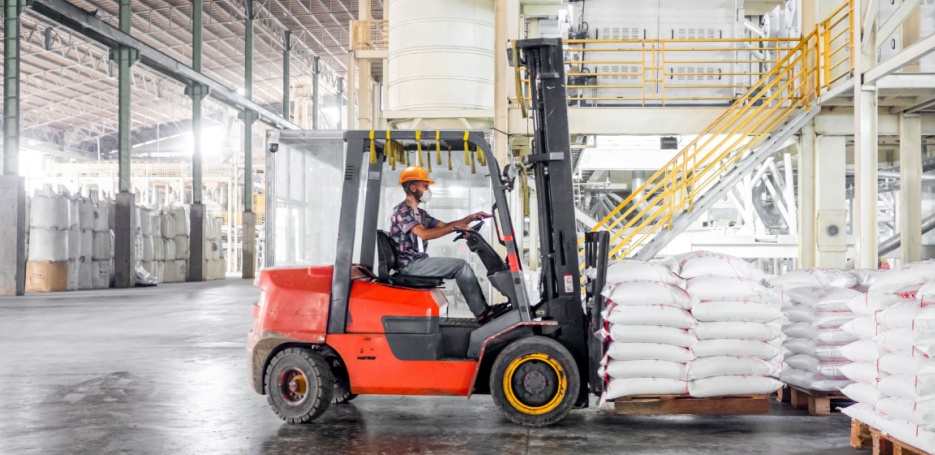Forklifts are essential tools in MANY industries – from warehouses and distribution centers to construction and manufacturing sites. Yet, with great power and utility, comes great responsibility. Improper use of forklifts leads to thousands of injuries and fatalities each year in Canada, many of which are entirely preventable when used with the correct caution.
At AIP Safety, we believe prevention is the most powerful tool in any workplace or on any worksite. Forklift safety starts with awareness, proper training, and a commitment to maintaining a safe environment for each and every employee, every day.
This Is Why Forklift Safety Truly Matters
When you take a moment to read the statistics…the numbers are truly staggering. Forklifts account for approximately 10% of workplace fatalities and 5% of serious injuries in Canada every year. Beyond the human cost, forklift-related incidents can cause irreparable equipment damage, loss of productivity, and severe financial strain for employers.
However, these incidents aren't inevitable – they're often the result of avoidable mistakes. That’s why detailed safety education and adherence to these protocols are key pillars in any workplace setting where forklifts are used.
Let's Talk About The Economic Impact of Forklifts
Forklift operations play a significant role in Canada's economy, supporting sectors like manufacturing, construction, and retail. The industrial truck industry alone employs thousands of workers directly and indirectly, with an inevitable ripple effect across Canada's supply chains, maintenance crews, equipment manufacturers, and much more.
As reliance on forklifts grows, so must the emphasis on responsible operation of this kind of machinery and a safety-first approach when it comes to training.
Key Forklift Safety Tips from AIP
Even the most advanced and reliable machines can’t protect against accidental operator error or poor judgment. Whether you’re a seasoned forklift operator or starting your first day on the job, these essential safety protocols and practices should be an essential part of your daily routine:
1. Perform a Pre-Use Inspection
Before even turning the key, you should always do a walk-around inspection. Look for visible damage, leaks, tire wear, and check the fluid levels. Addressing these small issues before they escalate can prevent major accidents on the job – better safe than sorry.
2. Maintain Visibility and Awareness | Look Before You Leap
Always, always, ALWAYS, drive in the direction where visibility is best. If a load blocks your view, you can operate in reverse. Use your mirrors to keep a 360° awareness of your surroundings, and make eye contact with pedestrians or co-workers nearby to ensure they see you, and you see them.
3. Understand the Stability Triangle
Forklifts rely on something called the “stability triangle” – a three-point suspension system that keeps the load and machine in perfect balance. Overloading or improperly securing a load can throw off this balance, leading to dangerous tip-overs any other accidents or damages of goods, products, or people.
4. Never Exceed Load Limits | Take Two Trips If You Need
It’s absolutely crucial to know the forklift’s rated capacity. Any extra attachments, improperly stacked loads, or shifting cargo can all contribute to the counterweight exceeding it's limit – therefore causing a potential rollover or dropped load – yikes.
5. Get Proper Certification
Unfortunately, many forklift incidents are caused by operators who simply haven’t received proper training. Certification isn’t just a legal requirement – it’s a critical safeguard for yourself, your workers and your business.
6. Prioritize Routine Maintenance
As with any motorized vehicle, Forklift's require consistent upkeep in order to keep malfunctions to a minimum – preferably zero. Scheduling routine maintenance and full inspections ensures the equipment runs safely and effectively.
How You Can Promote Forklift Safety at Work
Celebrating forklift safety doesn’t require a huge event or massive meeting – it just needs intention and attention to detail. Here are some simple ways to reinforce a culture of safety:
- Host a "Toolbox Talk" – Gather your crew for a quick coffee and a refresher on forklift safety protocols. The more regular these talks become, the more engrained this safety mindset will stick.
- Book On-Site Training – Bring in an expert to your workplace for tailored instruction, sometimes it helps having someone outside the organization come in to talk on a particular issue.
- Display Safety Signage – Post reminders in visible areas to reinforce daily habits – sometimes a visual is all people need to remind them.
- Lead by Example – Supervisors and experienced operators can model proper behavior – walk the walk.
Enroll in AIP’s Forklift Certification Course
Here at AIP Safety, our comprehensive forklift training course is designed to equip operators with the detailed knowledge and confidence to work safely and efficiently. Our CSA-compliant course includes a combination of both classroom theory and hands-on practice and is suitable for new and experienced operators alike.
Upon completion, participants will be certified to operate powered industrial trucks, with certification valid for three (3) years.
Certification topics include:
- Labour Canada Regulations and Occupational Health & Safety Regulations
- Skills required for a person to become professional operator
- Inspection and safety checks; proper and safe refueling
- Pallet safety
- Forklift maneuvering techniques
- The "stability triangle"
- Lifting, transporting and depositing a load
- Overview of safe operating principals
- Ramp and dock operations
- Loading dock and trailer safety
- Forklift operator safety manual
Whether you’re looking to certify your team or refresh your own skills for a safer work environment, AIP Safety is here to support a safer, smarter workplace.
Safety starts with proper training – and ends with everyone going home safe.
Get in touch with AIP Safety to book your forklift course or learn more about our training options today.

